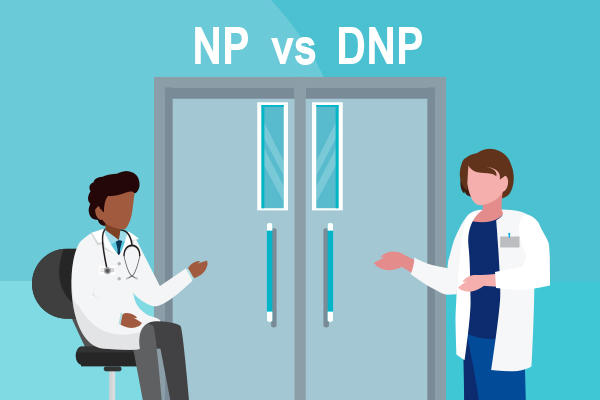Featured
Tags
Share
- Home / Blog / Nursing Today / 4 Tips for Landing New Grad Nurse Practitioner Jobs
4 Tips for Landing New Grad Nurse Practitioner Jobs

Congratulations! You’ve submitted your final assignment in your Family Nurse Practitioner (FNP) program and are studying for finals. Graduation is in sight, and so are your hopes for landing your first new graduate nurse practitioner job.
The path to finding a nursing job after graduation is easier when you’re prepared. And when you feel properly prepared for interview questions, you can then let your personality shine.
“One of the biggest factors is personality,” said Chamberlain graduate Tim Skalitzy, who recently landed a position as a cardiac FNP. “What I mean by that is, are you someone they want to work with? Do they think you will be a good fit in the team? Do you seem like someone they can teach?”
Below, find advice to help polish your resume and get you ready for your first nursing job interviews.
Tips for Finding New Grad Nurse Practitioner Jobs
Remember, you never get a second chance to make a first impression when you’re looking for new grad NP jobs. So how do you present yourself as the best candidate every step of the way?
1. Get Your Resume in Order.
Your resume is often the first touch you will have with a potential employer as you work to find new graduate nurse practitioner jobs after graduation. The Career Services team at Chamberlain recently shared some guiding principles for FNP resumes:
DO:
- Use keywords
Read the descriptions for new graduate nurse practitioner jobs carefully. You’ll notice that it lists specific skills. Make sure to use those keywords in your resume and interview.
- Include a skills list
Perhaps you’re adept at using video conferencing systems or have taken a course in effective communication - if you have a skill relevant to the position, make sure to list it.
- Use action words
If you want to focus on getting a job as a new nurse, you don’t want to just list your duties at a previous job. Tell the reader what you did (or do).
- Include a good amount of white space
Make sure your resume doesn’t include too much information – especially information that is not relevant to new grad FNP jobs.
- Proofread!
Get someone else to proofread your resume. You need a new set of eyes to make sure you’ve expressed yourself well – and dotted your i’s.
- Save to Word
Submit your resume as a Word document, instead of a PDF. Some applicant tracking systems have more trouble reading a PDF than a Word doc.
DON’T:
- Use the same resume
Tailor each resume to the job description for all new grad NP jobs, and keep each version of your resume in a different folder in your computer.
- Use a casual or fun email address
You may like the email address that uses your two dogs and their birthdates, but don’t use it for applying to new graduate nurse practitioner jobs . Create a new one for professional purposes.
- List just your job duties
As mentioned above, don’t just list what you did in your previous job - focus on what you accomplished there.
- List every job you ever had
If it’s not relevant to new grad NP jobs, don’t list it.
- Include hobbies
Yes, your hobbies can tell us a little about you, but save that for the interview.
- Use a font that is below 10pts or above 12pts
If you’re a Chamberlain student or graduate, you can explore CareerCare for resume, curriculum vitae and cover letter templates – and even create and digitally store your resume.
2. Do your homework.
Once you’ve identified a few new graduate nurse practitioner jobs and secured an interview, remember that first impressions are key. It doesn’t take long for a hiring manager to make a decision. Around half of employers (51%) know within the first five minutes of an interview if a candidate is a good fit for a position, according to a nationwide survey conducted for CareerBuilder.
“The best solution to minimize pre-interview anxiety is solid preparation,” said Rosemary Haefner, chief human resources officer for CareerBuilder. “If you don’t read about the company and research your role thoroughly, you could magnify your fear of interviewing poorly and lose the opportunity.”
And if you’re looking for new grad nurse practitioner jobs, you need to use LinkedIn. Even if you haven’t created a page for yourself in LinkedIn, you can still use it to learn about an institution’s history, its people and new graduate nurse practitioner jobs..
For new grad nurse practitioner jobs, a panel interview with individuals from different areas of the organization is standard, according to tips from Melnic Consulting Group, a nationwide search firm focused on Advanced Practice placements for qualified Advanced Practice Registered Nurse (APRN) and Physician Assistant (PA) candidates.
Spend some time familiarizing yourself with the names and roles of each interviewer. You can learn more about your interviewers in the “People” section of an institution’s LinkedIn page.
Read More: 3 Ways Nursing Students Can Leverage LinkedIn
3. When it Comes to Interviews, Practice Makes Perfect.
Finding a nursing job after graduation requires preparation. Many online employment sites feature potential interviewer questions specific to the position you are seeking. You can brush up for the interview by practicing your answers to these questions:
- Tell me about yourself and any hands-on experience you have had as a nursing student?
- What inspired you to become a nurse practitioner?
- Why are you interested in this particular position?
- What makes you the most qualified candidate for this position?
A popular interview question for new grad nurse practitioner jobs is one where the interviewers ask you to describe a challenging situation you experienced in previous jobs and then explain how you handled it.
“In the four interviews I had, no one asked me any practice specific questions,” Skalitzy said. “I also asked my wife, who is a nurse practitioner and owns her own practice, and she said not to expect any of those. The common patient question seems to be explaining a difficult situation, how you handled it and the end result.”
One way to prepare for a question like this is to use the SOAR method. This acronym stands for the four things you should think carefully about before your interview.
- Situation – the “title” of your story: what exactly happened?
- Obstacle – what made this situation particularly difficult?
- Action – what did you do to overcome the obstacle?
- Result – once you overcame the obstacle, what positive outcome were you able to achieve?
What’s even better about SOAR is that as you think through the four components, you’ll be creating a story you can tell during the interview. An interesting story can really set you apart from other interviewees.
For example, suppose you answer this “describe a challenging situation” question with a story about how you handled a patient who fell out of a treehouse and broke her arm. The obstacle was that the break was an open fracture and the patient was allergic to the medication you wanted to give her. You explain how you resolved the problem. Later on, when the interviewers are talking, someone will say, “Oh yes – she was the one who talked about the treehouse.” Their other memories about your confidence, your personality and how ably you handled that situation will also come to mind.
4. Follow Up.
At the end of the interview for your first nursing job, be sure to express your appreciation and continued interest. Also, highlight one or two reasons why you are the ideal family nurse practitioner for the position. After you leave, write a thank you note to each interviewer and send it within two days of your meeting. This will help you make a lasting positive impression for all the new grad nurse practitioner jobs you are applying for.
Getting a job as a new nurse practitioner is within your reach when you prepare in this way and approach your search with confidence.
Learn more about Chamberlain’s MSN – Family Nurse Practitioner Specialty Track.
By Chamberlain University
More from Nursing Today
Request More Information
To receive the Chamberlain University Program Guide, including associated career paths, please select a program of study.







